Zendesk remains a widely used customer support platform, but growing costs and complexity drive many teams to explore alternatives. At $55 per agent monthly for basic features and $115+ when adding necessary capabilities, a 10-agent team often pays $1,100+ each month for functionality available elsewhere at lower cost.
This guide examines 10 proven Zendesk alternatives across different price points and use cases. We include detailed pricing breakdowns, feature comparisons, and specific fit recommendations for SaaS companies, financial services firms, and software teams managing high support volumes.
Why Support Teams Evaluate Zendesk Alternatives in 2026
Teams switch from Zendesk primarily due to escalating costs that start at $55 per agent monthly for basic features but climb to $100+ per agent when adding necessary capabilities. AI features add another $50 per agent monthly, pushing a 15-agent team to approximately $2,250 monthly or $27,000 annually.
Implementation timelines of 4-8 weeks for basic configurations create friction for teams needing faster deployment. Most teams report spending significant time building workflows, automation rules, and custom fields before launching to customers, delaying time-to-value.
Text-based ticketing struggles with software interface issues, leading to resolution times 3-5x longer than visual guidance methods when customers need help with UI problems. Screenshots and lengthy back-and-forth exchanges extend average handle times for interface-related questions.
Feature utilization remains low, with most teams using only 30-40% of available Zendesk capabilities while paying for the complete platform. The extensive feature set creates steeper learning curves, requiring 2-3 weeks for new agents to reach full productivity compared to simpler alternatives.
Per-agent pricing makes growth expensive as costs scale linearly with team size. Adding seasonal support staff during peak periods increases monthly bills proportionally, creating budget constraints for companies with variable support volumes throughout the year.
Top 10 Zendesk Alternatives: Quick Comparison
Best Zendesk Alternatives by Use Case
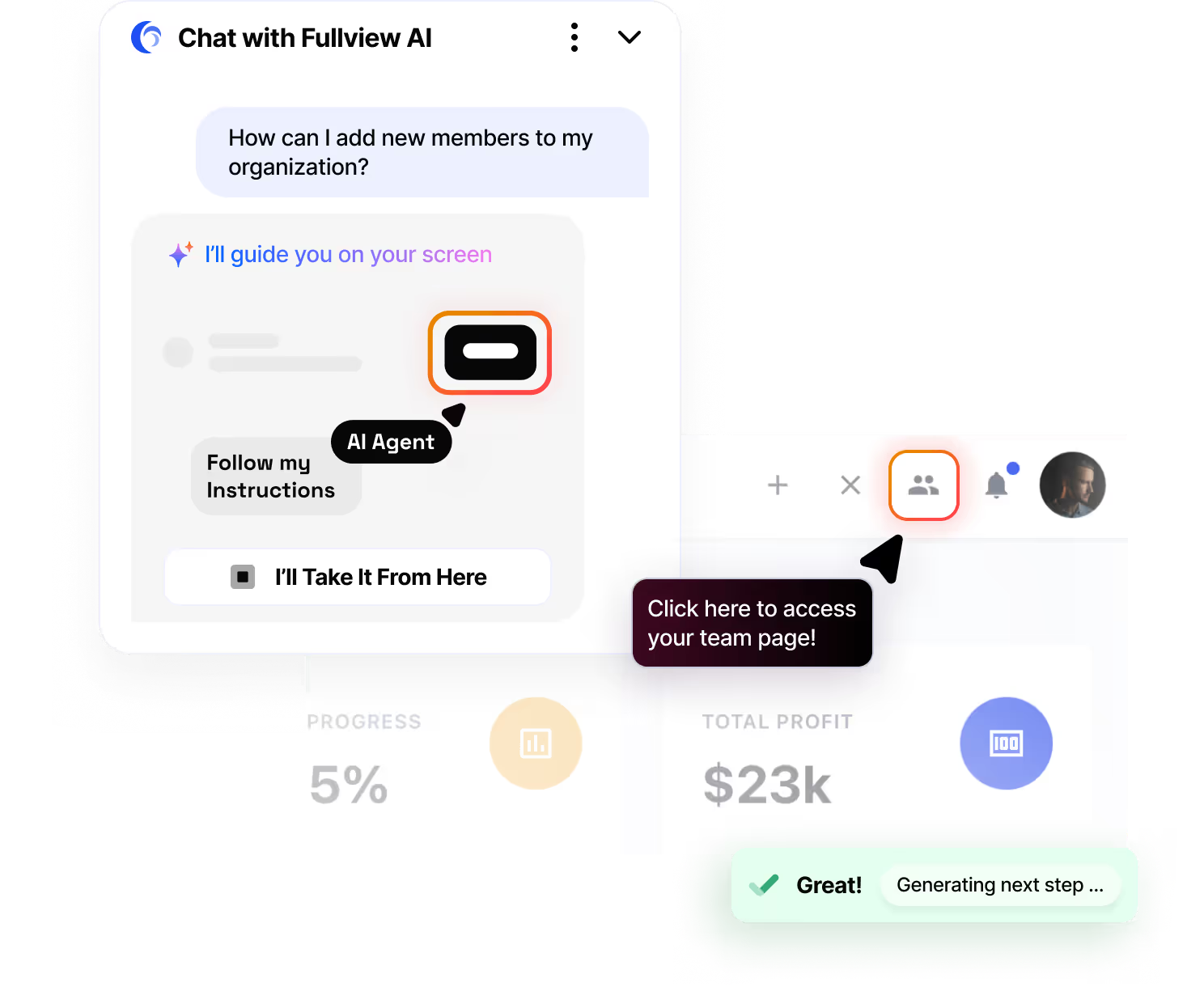
AI-First Customer Support: Fullview
Fullview provides autonomous AI support agents that handle customer inquiries conversationally across multiple channels. The platform combines fast, contextual conversational AI with unique visual guidance capabilities that set it apart from text-only alternatives like Intercom Fin or Zendesk AI.
How Fullview works: Build AI agents using the no-code builder, training them on your knowledge base, help center, and documentation. These agents handle support conversations autonomously through email, chat, and in-app interfaces, asking intelligent follow-up questions and understanding context like a human support agent. When text explanations are not enough for complex software workflows, Fullview agents can show users step-by-step visual instructions directly on their screen using DOM analysis. This complete approach resolves support requests without human intervention while providing seamless escalation when needed.
Key capabilities:
- Autonomous conversational AI agents that understand context and ask intelligent follow-up questions
- No-code AI agent builder enables deployment 75% faster than developer-dependent platforms like Forethought
- DOM-aware visual guidance shows users step-by-step instructions on their actual screen for complex workflows
- Multi-channel support across email, chat, and in-app interfaces with consistent AI responses
- Knowledge base connectors integrate with Intercom, Zendesk, website content, and uploaded files
- Topic management with publishing controls ensures quality guidance before customers see it
- Session replays automatically record every AI interaction for quality assurance and escalation context
- Seamless escalation to human agents with full conversation history, session replays, and console logs
- Real-time cobrowsing for complex issues requiring human support with visual assistance
- Helpdesk integrations work with Zendesk, Intercom, and Salesforce workflows
- Enterprise security with SOC 2 Type II certification, GDPR compliance, and data residency options
Pricing breakdown:
- Free plan: $0 monthly for 50 conversations with conversational AI capabilities
- Growth plan: Starts at $96 monthly for 200 conversations (approximately $0.48 per conversation)
- Conversation volume tiers: 200, 600, 800, 1,000, 1,200, 1,400, 1,600, 1,800, 2,000+ conversations
- Custom plan: Custom pricing for higher volumes with dedicated success manager
- Security & Compliance: SOC 2 Type II certified, GDPR compliant, data residency options (EU/US)
- Add-ons: AI Analytics ($189/month), AI Replays ($199/month), custom integrations
- Free trial: 14 days with all Growth plan features including visual guidance
Best for: SaaS companies, financial services firms, and software teams where customers need help with conversational questions AND complex interface workflows. SOC 2 Type II certification and GDPR compliance make Fullview suitable for regulated industries requiring strong security posture. Teams wanting AI agents to handle routine inquiries autonomously while providing visual assistance for technical tasks that traditionally require screenshots and lengthy back-and-forth exchanges.
What makes Fullview different from Intercom Fin and Zendesk AI:
Integration approach: Fullview works standalone with its own chat widget or integrates with existing helpdesk platforms. Most teams use Fullview AI agents to deflect tickets before they reach Zendesk or Intercom, while keeping those platforms for cases requiring human escalation. This hybrid approach reduces ticket volume while maintaining familiar workflows for complex cases.
Deployment timeline: Basic AI agent setup completes in under 30 minutes. Full visual guidance deployment with topic publishing and team training takes 1-2 weeks. Compare this to 4-8 weeks for developer-dependent platforms like Forethought or Zendesk AI implementations.
Conversational Relationship Building: Intercom
Intercom shifts from traditional ticketing toward ongoing customer relationships through messaging. The platform treats support as conversations rather than isolated incidents, creating continuity across multiple interactions.
How Intercom works: Customer interactions flow through a unified inbox combining support, sales, and product engagement. Fin AI answers common questions automatically through text-based responses, while human agents handle complex conversations with full customer context and history.
Key features:
- Proactive messaging reaches customers before they encounter problems
- Fin AI provides automated text-based responses to common questions
- Product tours and in-app messaging guide users through features
- Unified customer profiles span support, sales, and marketing interactions
- Mobile SDK enables in-app support within native applications
- Workflow automation routes conversations based on customer attributes
Pricing: Starts at $39 per seat monthly for basic features. AI capabilities through Fin require higher-tier plans starting at $99 per seat monthly. A 10-agent team using Fin AI pays approximately $990 monthly or $11,880 annually.
Best for: Teams building ongoing relationships with customers rather than treating each interaction as a separate incident. Works well for companies blurring lines between support, customer success, and sales teams.
Limitations: The conversational approach requires rethinking traditional support workflows. Some teams find it less structured for complex case management with multiple escalations or hand-offs between departments. Fin AI handles text-based automation but cannot provide visual guidance for software interface issues.
Enterprise CRM Integration: Salesforce Service Cloud
Service Cloud provides deep integration with the broader Salesforce ecosystem. Organizations already using Salesforce for sales or marketing create unified customer data across their entire operation through Service Cloud.
How Service Cloud works: Customer support cases integrate directly with sales opportunities, marketing campaigns, and business intelligence dashboards. Einstein AI provides predictive insights and automated case routing based on comprehensive CRM data.
Key features:
- Complete integration with Salesforce CRM data across sales, marketing, and service
- Einstein AI delivers intelligent routing and predictions using customer history
- Multi-channel support spans email, chat, phone, and social media
- Field service management coordinates on-site support activities
- Extensive customization and workflow automation match complex business processes
- Compliance features meet requirements for regulated industries
Pricing: Ranges from $25 to $500+ per user monthly depending on feature requirements. Most teams need mid-tier plans at $80-165 per user monthly for meaningful functionality. A 15-agent team on Professional tier pays approximately $1,800 monthly or $21,600 annually.
Best for: Organizations already using Salesforce products who need customer support data flowing seamlessly into sales pipelines and business systems. Enterprise teams requiring extensive customization, compliance features, and unified customer views across departments.
Limitations: Implementation requires significant planning and often dedicated technical resources. The learning curve is steep, with new agents requiring 3-4 weeks to reach productivity. The platform can feel overwhelming for teams wanting straightforward support management without enterprise complexity.
Cost-Effective Helpdesk: Freshdesk
Freshdesk delivers solid helpdesk functionality at lower price points than Zendesk. The platform covers essential ticketing, automation, and reporting without premium costs.
How Freshdesk works: Standard ticketing system handles email, chat, phone, and social media support. Automation manages routine tasks, while collaboration features help teams work together on complex issues.
Key features:
- Multi-channel ticketing across email, chat, phone, and social platforms
- Automation and workflow rules reduce manual ticket handling
- Self-service knowledge base enables customer self-help
- Team collaboration tools coordinate responses across agents
- Basic reporting and analytics track team performance
- Freddy AI provides agent assistance on higher-tier plans
Pricing: Starts at $15 per agent monthly for basic features. Growth plan at $49 per agent monthly includes automation and time tracking. Pro plan at $79 per agent monthly adds advanced reporting and AI features. A 10-agent team on Growth plan pays $490 monthly or $5,880 annually.
Best for: Small to mid-sized teams needing reliable ticketing without enterprise-level costs. Good fit for teams transitioning from email-only support to structured helpdesk management.
Limitations: AI features are basic compared to platforms like Fullview or Intercom Fin. The interface feels dated compared to modern alternatives. Some advanced features require higher-tier plans, reducing the cost advantage.
Email-Focused Simplicity: Help Scout
Help Scout focuses on shared inbox functionality without the complexity of full helpdesk platforms. The design philosophy keeps support personal and straightforward.
How Help Scout works: Customer emails flow into a shared team inbox. Agents collaborate on responses, and customers see replies as regular emails rather than ticket numbers. The Docs knowledge base provides self-service options.
Key features:
- Shared inbox with email-like interface maintains personal touch
- Collision detection prevents duplicate responses from multiple agents
- Customer profiles display conversation history and context
- Docs knowledge base enables self-service support
- Reporting tracks team performance and customer satisfaction metrics
- Beacon widget provides in-app support when needed
Pricing: Standard plan at $20 per user monthly includes all core features. Plus plan at $40 per user monthly adds advanced reporting and automation. No free plan available. A 10-agent team on Standard plan pays $200 monthly or $2,400 annually.
Best for: Teams prioritizing personal, email-style communication over formal ticketing systems. Small teams of 5-25 people wanting straightforward support management without extensive configuration requirements.
Limitations: Limited automation compared to full helpdesk platforms. Not ideal for teams needing complex workflows, SLA management, or multi-channel support beyond email and live chat. AI capabilities are minimal.
Unified Business Platform: HubSpot Service Hub
Service Hub integrates tightly with HubSpot's CRM, marketing, and sales tools. Organizations already using HubSpot for other functions create unified customer experience platforms through Service Hub.
How Service Hub works: Support tickets connect to contact records, deal pipelines, and marketing campaigns. Automation routes tickets based on customer data, while reporting shows how support impacts revenue and customer lifecycle stages.
Key features:
- Complete integration with HubSpot CRM creates unified customer views
- Ticketing, live chat, and knowledge base handle standard support workflows
- Customer feedback and NPS surveys measure satisfaction
- Conversation routing and automation direct inquiries to appropriate agents
- Custom reporting dashboards connect support metrics to business outcomes
- Playbooks create repeatable workflows for common scenarios
Pricing: Starter plan at $20 per seat monthly includes basic features. Professional at $100 per seat monthly adds automation and custom reporting. Enterprise at $150 per seat monthly includes advanced features. A 10-agent team on Professional plan pays $1,000 monthly or $12,000 annually.
Best for: Companies already using HubSpot for marketing or sales who want unified customer data. Teams needing support metrics tied directly to revenue and customer lifecycle stages.
Limitations: Best value comes from using multiple HubSpot products together. Standalone Service Hub lacks some features found in dedicated helpdesk platforms. AI capabilities lag behind specialized support tools like Fullview or Intercom.
Startup-Friendly Pricing: Zoho Desk
Zoho Desk provides affordable helpdesk software with integration across the Zoho ecosystem. The platform balances features and cost, making it accessible for early-stage companies with limited budgets.
How Zoho Desk works: Standard ticketing handles multi-channel support. Zia AI assistant helps agents with responses and predictions. Integration with Zoho CRM, projects, and other apps creates connected workspace.
Key features:
- Multi-channel ticketing spans email, social media, chat, and phone
- Zia AI provides basic agent assistance and predictive features
- Self-service portal and community forums enable customer self-help
- Automation and workflow management reduce manual work
- Integration with Zoho suite creates connected business tools
- Mobile apps support on-the-go customer service
Pricing: Free plan for up to 3 agents. Standard at $14 per agent monthly. Professional at $23 per agent monthly adds advanced features. Enterprise at $40 per agent monthly includes AI and analytics. A 10-agent team on Professional plan pays $230 monthly or $2,760 annually.
Best for: Startups and small businesses already using Zoho products. Teams needing affordable helpdesk software with room to scale. Companies wanting decent features without premium pricing.
Limitations: Interface feels less modern than newer platforms like Fullview or Intercom. AI features are basic compared to specialized tools. Some users report customer support response times can be slow.
Collaborative Team Workspace: Front
Front reimagines the shared inbox with powerful collaboration features. The platform bridges email, chat, SMS, and social media into one workspace where teams coordinate responses efficiently.
How Front works: All customer communication channels flow into a unified inbox. Team members comment internally, assign conversations, and use workflows to route inquiries. Customers see standard email responses while your team collaborates behind the scenes.
Key features:
- Unified inbox consolidates all communication channels
- Internal commenting and collaboration coordinate team responses
- Workflow automation and rules route conversations appropriately
- Shared drafts and templates ensure consistent messaging
- Analytics track team performance and response times
- Integration with 100+ tools connects to existing workflows
Pricing: Starter at $19 per seat monthly for basic features. Growth at $59 per seat monthly adds automation. Scale at $99 per seat monthly includes advanced features. Custom enterprise pricing available. A 10-agent team on Growth plan pays $590 monthly or $7,080 annually.
Best for: Teams where multiple people need visibility into customer conversations. Companies using email as their primary support channel but needing better coordination than Gmail or Outlook provides.
Limitations: More expensive than basic shared inbox tools like Help Scout. Not ideal for teams needing traditional ticketing with SLA management, escalation workflows, or field service features.
IT Service Management: Freshservice
Freshservice extends Freshdesk's capabilities with IT service management features. Built for IT teams supporting internal employees or managing technical customer issues.
How Freshservice works: ITIL-based service management handles incident, problem, change, and asset management. AI-powered automation processes routine requests, while self-service portal reduces ticket volume.
Key features:
- ITSM workflows manage incidents, problems, and change requests
- IT asset management and discovery track hardware and software
- Service catalog and request fulfillment automate common requests
- AI-powered automation through Freddy handles routine tasks
- Integration with monitoring tools provides proactive support
- SLA management and escalations ensure timely resolution
Pricing: Starter at $19 per agent monthly. Growth at $49 per agent monthly. Pro at $95 per agent monthly. Enterprise at $125 per agent monthly includes advanced ITSM features. A 10-agent IT team on Pro plan pays $950 monthly or $11,400 annually.
Best for: IT teams managing internal support or technical customer issues. Organizations needing ITIL-compliant service management. Companies wanting IT asset tracking alongside helpdesk capabilities.
Limitations: Overkill for simple customer support scenarios. The ITSM focus makes it less suitable for general customer service teams. Interface complexity reflects enterprise-level feature set.
Phone-Centric Support: Dixa
Dixa focuses on teams where phone support is central to their operations. The platform combines VoIP capabilities with intelligent routing and unified customer data across all channels.
How Dixa works: Built-in VoIP handles inbound and outbound calls with intelligent routing based on agent skills, availability, and customer data. Call recordings, real-time monitoring, and quality management help optimize phone support. Email, chat, and social channels feed into the same interface so agents have full customer context.
Key features:
- Built-in VoIP with call recording and real-time monitoring
- Intelligent call routing based on skills, availability, and customer attributes
- Unified inbox consolidates phone, email, chat, and social channels
- Real-time analytics and reporting track call center metrics
- Quality management tools monitor and improve agent performance
- Integration with major platforms connects to existing tools
Pricing: Custom pricing based on team size and features needed. Generally positioned in the mid-market range between Freshdesk and Zendesk. Most teams report costs of $50-80 per agent monthly.
Best for: Teams where phone support is a primary channel. Call centers handling high call volumes. Companies needing strong VoIP capabilities with intelligent routing alongside email, chat, and social support.
Limitations: Custom pricing makes cost comparison difficult. Smaller teams or tight budgets may find simpler alternatives more appropriate. Feature set targets mid-market and enterprise rather than startups.
Zendesk vs Top Alternatives: Detailed Feature Comparison
How to Choose the Right Zendesk Alternative for Your Team
Selecting the best alternative depends on your specific needs, budget, support model, and growth plans. Use this decision framework to narrow your options.
By Company Size
1-10 employees: Early-stage teams benefit most from Fullview's free plan delivering 50 AI-powered conversations monthly at no cost, ideal for testing AI support capabilities before committing budget. The Fullview Growth plan at $96 monthly provides autonomous AI support for less than hiring a single agent. Teams preferring traditional email-based support without AI can consider Help Scout ($20 per user) or Zoho Desk ($14 per agent).
11-50 employees: Fullview's Growth plan scales conversation-based pricing as you grow, avoiding the per-seat cost increases that make traditional platforms expensive during expansion. Teams needing traditional ticketing can evaluate Freshdesk ($15-79 per agent) for cost-feature balance. Front ($19-99 per seat) or HubSpot Service Hub ($20-150 per seat) fit teams prioritizing collaboration or marketing integration over AI automation.
51-200 employees: Fullview's Growth to Custom plans provide AI automation with visual guidance as complexity increases, with conversation-based pricing that adapts to seasonal fluctuations common at this scale. Intercom ($39-99 per seat) serves teams building customer relationships across support and sales. Salesforce Service Cloud ($25-500 per user) fits organizations already heavily invested in the Salesforce ecosystem.
200+ employees: Fullview's Custom plan scales to enterprise volumes with dedicated success manager, SSO, security reviews, and SLA guarantees. Salesforce Service Cloud handles organizations requiring deep CRM integration across large, complex operations. Dixa (custom pricing) specializes in large call center operations with phone as the primary channel. Freshservice ($19-125 per agent) targets IT service management teams rather than customer-facing support.
By Primary Support Channel
Email-focused support: Fullview handles email support autonomously through AI agents, deflecting routine inquiries before they reach your team. Teams preferring traditional shared inbox simplicity over AI automation can evaluate Help Scout, while Front provides advanced collaboration features across email channels for teams needing coordination.
Live chat priority: Fullview provides autonomous AI agents for in-app chat with DOM-aware visual guidance when text explanations are insufficient. Intercom serves teams prioritizing proactive messaging and product tours alongside support automation.
Phone-heavy operations: Fullview reduces call volume by deflecting routine inquiries through chat and email before they escalate to phone support. Dixa specializes in phone-first operations needing VoIP routing and quality management as the primary channel.
In-app support: Fullview is purpose-built for in-app support with conversational AI and visual guidance for complex software workflows. Intercom provides in-app messaging combined with marketing and sales engagement for teams prioritizing multi-departmental customer engagement.
Multi-channel requirements: Fullview handles email and chat autonomously with consistent AI responses across channels. Freshdesk or HubSpot Service Hub fit teams needing phone support integrated alongside email and chat in traditional ticketing workflows.
By Budget Constraints
Under $500 monthly: Fullview's free plan provides 50 AI-powered conversations at no cost for teams testing autonomous support. The Fullview Growth plan at $96 monthly delivers autonomous AI support for the cost of 1-2 agents on traditional platforms. Teams preferring traditional per-agent ticketing can evaluate Zoho Desk ($230 for 10 agents) or Freshdesk ($150-490 for 10 agents).
$500-2,000 monthly: Fullview's Growth plan scales with conversation volume, providing cost efficiency for teams with seasonal or variable support loads compared to fixed per-seat pricing. HubSpot Service Hub ($200-1,000 for 10 seats) fits teams already using HubSpot for marketing or sales. Front ($190-990 for 10 seats) serves teams where email collaboration is the primary need.
$2,000-5,000 monthly: Fullview's Custom plan provides visual guidance, advanced features, and higher conversation limits in this range. Intercom costs $990+ for 10 seats with Fin AI for conversational support with proactive messaging. Salesforce Service Cloud runs $1,650+ for 10 users when deep CRM integration is required.
$5,000+ monthly: Fullview's Custom plan delivers enterprise features including SSO, security reviews, SLA guarantees, and dedicated success manager. Salesforce Service Cloud scales for large enterprises requiring comprehensive CRM integration across complex operations. Enterprise tiers of other platforms provide advanced features and dedicated support at this level.
By Specific Use Case
Software and SaaS companies:
Fullview is purpose-built for this use case. Autonomous AI agents handle conversational support while DOM-aware visual guidance resolves complex interface tasks that text-only chatbots cannot address. This combination specifically targets software companies where customers need help both understanding features AND completing workflows in your product.
Companies needing visual product support:
Fullview is the only platform providing DOM-aware visual guidance. If your customers struggle with UI tasks that require screenshots and lengthy explanations, Fullview shows them step-by-step instructions directly on their screen. No alternative offers this capability.
Teams wanting to reduce support costs:
Fullview's conversation-based pricing and autonomous AI agents reduce costs by deflecting routine inquiries before they reach your team, while avoiding per-seat pricing that scales expensively as you grow. Conversation-based billing means you only pay for actual usage, not idle agent capacity.
Financial services and complex B2B software:
Fullview handles the compliance, accuracy, and visual guidance requirements these industries demand. SOC 2 Type II certification and GDPR compliance meet security standards for regulated industries. Train AI agents on your documentation to ensure accurate responses, while visual guidance shows customers how to navigate complex workflows without exposing sensitive data through screenshots.
Teams already using Zendesk or Intercom:
Fullview integrates with your existing helpdesk to add AI deflection and visual guidance while keeping familiar ticketing workflows for escalations. Most teams use this hybrid approach rather than replacing their entire support infrastructure.
Alternative use cases where competitors excel:
- Relationship building and proactive engagement: Intercom treats support as ongoing conversations with proactive messaging, product tours, and unified customer profiles across support and sales
- Deep Salesforce CRM integration: Salesforce Service Cloud for organizations heavily invested in Salesforce ecosystem requiring unified customer data across sales, marketing, and service
- Simple email-only teams: Help Scout for teams wanting straightforward shared inbox without complexity of AI or advanced automation
- IT service management: Freshservice for IT teams needing ITIL-compliant workflows, asset management, and change control
- Phone-centric call centers: Dixa for operations where phone is the primary channel requiring specialized VoIP routing and quality management
By Technical Setup Requirements
No-code setup preferred: Fullview deploys basic AI agents in under 30 minutes with no coding required, 75% faster than developer-dependent platforms. Teams wanting traditional ticketing can consider Help Scout or Freshdesk for simple configuration, or HubSpot for straightforward setup when already using their products.
Some configuration acceptable: Fullview's full visual guidance deployment takes 1-2 weeks including topic publishing and team training. Intercom requires 2-4 weeks for setup with guided onboarding and workflow configuration. Front needs planning for collaboration rules and routing but doesn't require coding expertise.
Technical team available: Fullview's Custom plan handles technical integrations with Salesforce, custom workflows, SSO configuration, and security reviews. Salesforce Service Cloud involves complex implementation requiring dedicated resources, typically 4-8+ weeks. Freshservice benefits from technical planning and configuration for ITSM workflows.
Developer resources for custom integrations: Fullview provides robust API access for custom integrations while maintaining no-code setup for core AI agent features. Salesforce, Intercom, and HubSpot offer extensive API capabilities for teams building custom workflows and integrations beyond standard functionality.
Making the Switch from Zendesk to Alternatives
Migrating helpdesk platforms requires planning but should not be overwhelming. Most alternatives provide migration assistance and can import your existing data with minimal disruption.
Typical Migration Timeline
Week 1: Data export and planning
- Export data from Zendesk including tickets, contacts, and knowledge base
- Document current workflows, automations, and integrations
- Map Zendesk features to new platform capabilities
Week 2: Platform configuration
- Configure new platform settings and permissions
- Build workflows and automation rules
- Set up integrations with existing tools
Week 3: Data import and testing
- Import exported data into new platform
- Test workflows with small internal team
- Identify and resolve any data mapping issues
Week 4: Team training
- Train full team on new platform
- Begin parallel operations with both systems
- Monitor for issues and gather feedback
Week 5-6: Full migration
- Complete transition to new platform
- Decommission Zendesk account
- Monitor metrics for disruptions
Critical Data to Migrate
Customer information:
- Contact records with email addresses, phone numbers, and custom fields
- Customer profiles with interaction history
- Tags, segments, and custom attributes
Support content:
- Active tickets with current status
- Historical tickets for reference (6-12 months recommended)
- Knowledge base articles with formatting
- Canned responses, macros, and templates
Configuration elements:
- Business rules and automation workflows
- Custom fields and ticket forms
- Agent accounts with permissions
- SLA policies and escalation rules
Integration data:
- Connected tool configurations
- Webhook endpoints
- API credentials and access tokens
Integration Considerations
Most Zendesk alternatives integrate with popular business tools. Verify specific integrations before switching:
CRM platforms:
- Salesforce, HubSpot, Pipedrive integration capabilities
- Contact syncing and deal association features
Communication tools:
- Slack, Microsoft Teams notifications
- Internal collaboration features
Development platforms:
- Jira, GitHub, GitLab ticket linking
- Developer-focused integrations
Analytics tools:
- Mixpanel, Amplitude, Google Analytics connections
- Custom reporting integrations
AI and automation:
- Fullview integrates with Zendesk, Intercom, and Salesforce
- Most platforms offer Zapier or Make.com connections for custom workflows
Frequently Asked Questions About Zendesk Alternatives
How much can teams save by switching from Zendesk?
Most teams save 30-50% on per-agent costs when switching to alternatives. Freshdesk costs $15-49 per agent monthly compared to Zendesk's $55-115 per agent. For a 10-agent team, this translates to $400-660 less monthly, or $4,800-7,920 annually. Fullview's conversation-based pricing saves even more for teams with seasonal support needs, as you pay only for conversations used rather than maintaining unused agent seats during slow periods.
Will teams lose features by switching to cheaper alternatives?
Not necessarily. Most teams use only 30-40% of Zendesk's available features. Simpler alternatives often provide the core functionality teams actually need without unused complexity. However, if you heavily rely on advanced features like custom objects, complex SLA management with multiple tiers, or extensive API integrations, evaluate whether alternatives support your specific workflows before switching. Request feature-specific demos to verify critical capabilities.
Do Zendesk alternatives offer visual product guidance?
Fullview is currently the only platform combining conversational AI agents with DOM-based visual guidance that shows users step-by-step instructions directly on their screen. Traditional alternatives like Zendesk, HubSpot, Intercom, and Freshdesk rely on text-based chatbots and knowledge base articles. Fullview AI agents handle support conversations through text first, but can escalate to visual walkthroughs when customers need help with complex software workflows or UI tasks that text cannot adequately explain.
Can Fullview work alongside existing Zendesk or Intercom setups?
Yes. Fullview is designed to enhance existing helpdesk platforms rather than replace them completely. Most teams integrate Fullview with Zendesk or Intercom to add autonomous AI agents and visual guidance capabilities while keeping their current ticketing workflows for escalations. This hybrid approach reduces ticket volume through AI deflection while maintaining familiar processes for complex cases requiring human intervention.
How long does implementing a Zendesk alternative typically take?
Implementation timelines vary by platform complexity and team size:
- Simple alternatives (Help Scout, Freshdesk): 1-2 weeks for basic setup and team training
- Mid-complexity platforms (Intercom, HubSpot): 2-4 weeks including configuration and integrations
- Enterprise solutions (Salesforce): 4-8 weeks or longer for full implementation with customization
- Fullview: Under 30 minutes for basic AI agent setup, 1-2 weeks for complete visual guidance deployment with topic publishing
Factor in additional time for data migration, parallel testing, and agent training regardless of platform choice.
Do teams need technical expertise to set up these alternatives?
Most modern alternatives are designed for non-technical users. Platforms like Help Scout, Freshdesk, and Fullview offer no-code setup with guided onboarding. Mid-tier platforms like Intercom and HubSpot may benefit from some technical knowledge for advanced features like custom integrations or complex automation rules. Enterprise platforms like Salesforce Service Cloud typically require dedicated technical resources or implementation partners for configuration, customization, and ongoing management.
What happens to historical data when switching platforms?
Most platforms provide migration tools to import historical tickets, contacts, and knowledge base articles from Zendesk. Some data loss is possible with highly customized fields or complex multi-level workflows. Plan for data cleanup during migration, as it provides a good opportunity to archive old tickets and update outdated information. Critical data to preserve includes active tickets with current status, customer contact records with interaction history, and knowledge base content with proper formatting.
How do customers experience the platform change?
When implemented well, customers notice improved support quality rather than platform changes. Key steps to minimize disruption:
- Maintain consistent communication channels including email addresses and chat widgets
- Keep knowledge base URLs functional through redirects
- Train agents thoroughly before switching to ensure consistent response quality
- Communicate any changes to customers in advance
- Monitor satisfaction metrics closely during transition period
Most customers care about response times and resolution quality, not which platform powers the backend.
Can teams try alternatives before committing to annual contracts?
Most platforms offer free trials or free plans to test before committing:
- Fullview: Free plan with 50 conversations monthly, no credit card required
- Freshdesk: 21-day free trial on paid plans
- Help Scout: 15-day free trial
- Intercom: 14-day free trial
- HubSpot: Free plan available with basic features
- Front: 7-day free trial
Enterprise platforms like Salesforce typically require demos and custom pricing discussions rather than self-service trials. Use trial periods to test workflows with real support scenarios and involve your full team in evaluation.
How do AI capabilities compare across Zendesk alternatives in 2026?
AI capabilities vary significantly across platforms:
Fullview: Autonomous conversational AI agents trained on your knowledge base handle support conversations independently. Agents ask intelligent follow-up questions, understand context, and can escalate to DOM-aware visual guidance for complex software workflows. The complete platform approach combines conversational AI, visual guidance, session replays, and seamless escalation.
Intercom Fin: Conversational AI trained on knowledge base content. Good at answering questions through text but does not provide visual assistance or understand software interfaces beyond text descriptions.
Zendesk AI: Focused on agent productivity including intelligent routing and response suggestions rather than autonomous customer support. Requires $50 per agent monthly add-on.
Freshdesk Freddy: Basic AI for agent assistance and simple automation. Limited autonomous support capabilities.
Others: Most alternatives have limited or no AI features without add-ons. Platforms like Help Scout, Front, and Zoho Desk focus on workflow automation rather than conversational AI.
What about GDPR compliance and data security for alternatives?
All major alternatives comply with GDPR and standard security frameworks:
- Fullview: SOC 2 Type II certified, EU-based company with GDPR compliance, data residency options (EU or US servers)
- Zendesk: SOC 2, ISO 27001, GDPR compliant
- Intercom: SOC 2, ISO 27001, GDPR compliant
- Salesforce: Comprehensive security certifications for enterprise requirements
- Others: Most platforms offer GDPR compliance and standard security measures
Verify specific compliance requirements with vendors during evaluation. Healthcare, financial services, and other regulated industries have additional requirements beyond standard GDPR.
Can alternatives integrate with tools teams already use?
Integration availability varies by platform. Most alternatives integrate with common business tools:
CRM platforms: Salesforce, HubSpot, Pipedrive integration capabilities
Communication tools: Slack, Microsoft Teams, Zoom notifications
E-commerce platforms: Shopify, WooCommerce, Stripe connections
Development tools: Jira, GitHub, GitLab ticket linking
Fullview specifically integrates with Zendesk, Intercom, and Salesforce, allowing you to add AI agents and visual features to existing helpdesk workflows. Verify critical integrations during platform evaluation to ensure smooth operations.
What if teams have industry-specific compliance requirements?
Healthcare, financial services, and other regulated industries have specific requirements:
Healthcare (HIPAA): Zendesk, Salesforce Service Cloud, and some enterprise alternatives offer HIPAA-compliant configurations with Business Associate Agreements. Fullview can provide HIPAA compliance on Custom plans. Verify HIPAA compliance before handling protected health information.
Financial services: Fullview's SOC 2 Type II certification meets financial services requirements for security and data protection. Salesforce provides additional robust security features, audit capabilities, and compliance frameworks required by financial regulators.
General compliance: Fullview and most platforms offer SOC 2 Type II, GDPR compliance, and data residency options for European or other regional requirements.
Discuss specific compliance needs with vendors before implementation. Some alternatives may require enterprise tiers for compliance features.
Start Building Your AI Support Agent Today
Fullview offers a free plan with 50 conversations monthly. No credit card required. Set up your first autonomous AI agent in under 30 minutes and start deflecting tickets with conversational AI and visual guidance.
The free plan includes:
- Conversational AI agent that understands context and asks intelligent follow-up questions
- Train on your knowledge base, help center, and documentation
- Embedded in-app or web chat interface
- Knowledge base connectors for easy setup
Ready to see how visual guidance works? Start your 14-day free trial of the Growth plan to test DOM-aware visual walkthroughs alongside conversational AI capabilities.




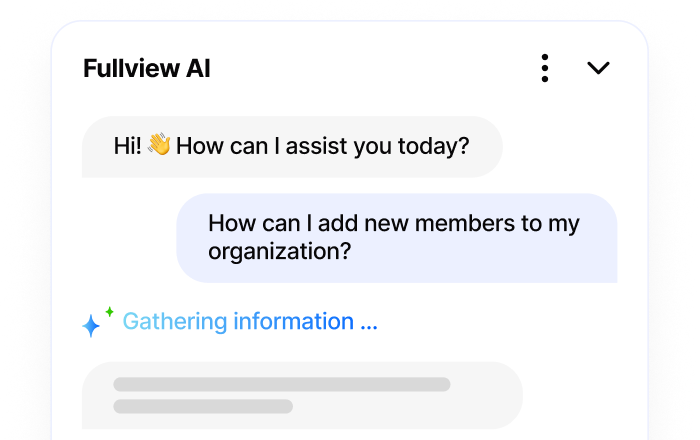
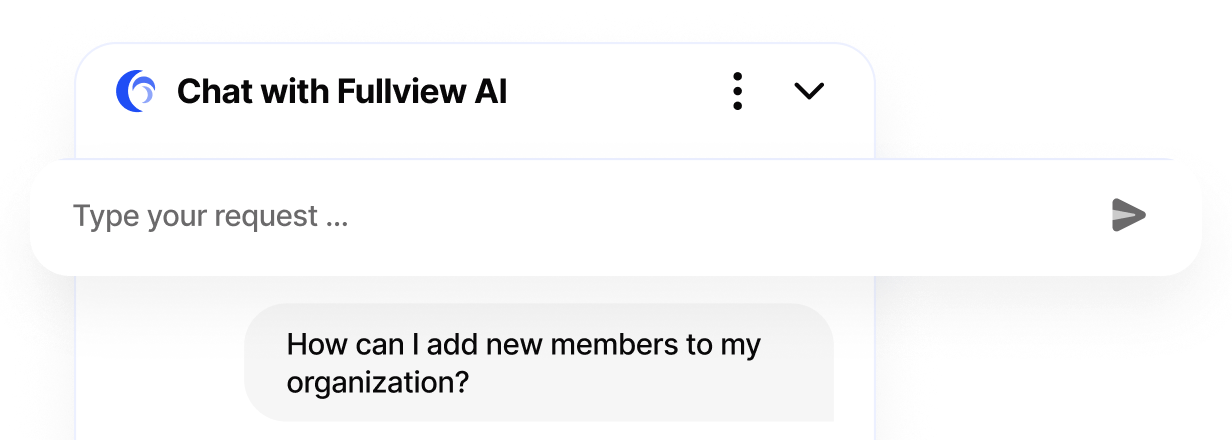
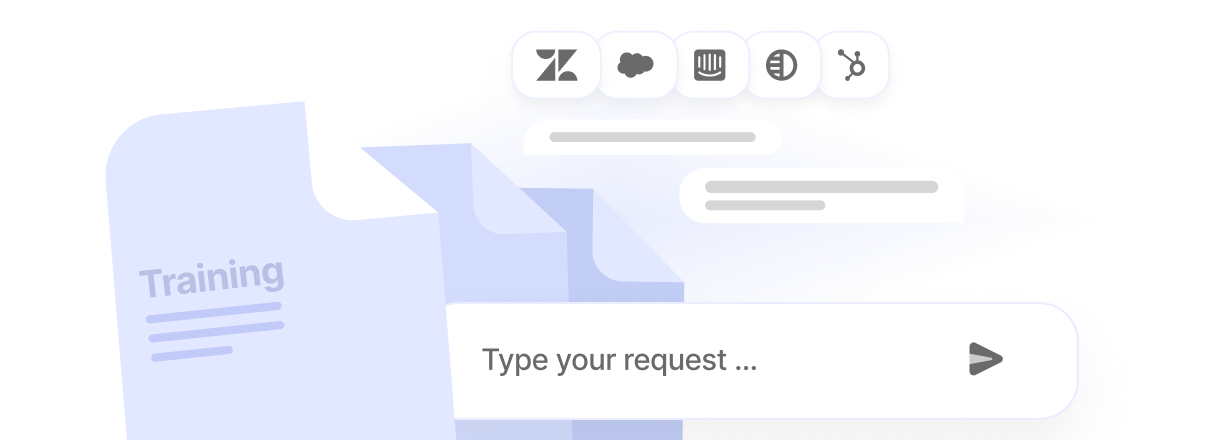
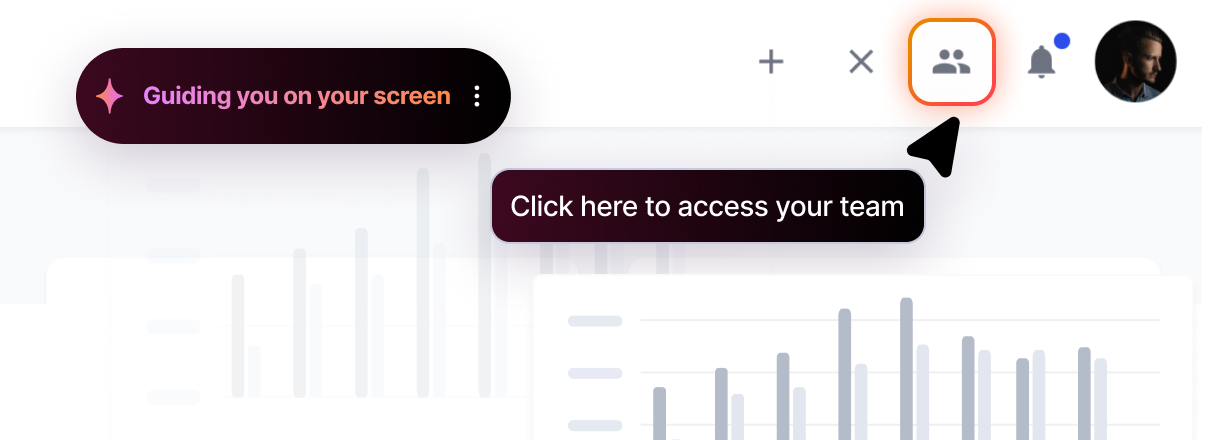
.webp)
